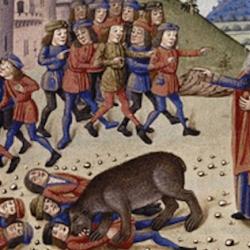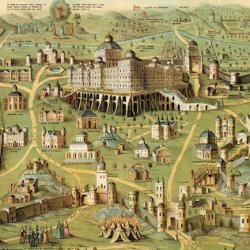Wisdom To Do Justice, 1 Kings 3:1-28
INTRODUCTION
1 Kings 3 is divided into three sections. The first is a brief notice about Solomon?s marriage to Pharaoh?s daughter, and the continuing practice of sacrifice on high places (vv. 1-3). The second, longer section is about Solomon?s request for wisdom (vv. 4-15), and this is followed by a demonstration of Solomon?s wisdom in the case of the two prostitutes (vv. 16-28).
The central passage, verses 4-15, is organized as a chiasm:
a. Sacrifice in Gibeon, v 4
b. Dream, v 5a
c. God?s speech, v 5b
d. Solomon?s speech, vv 6-9
-David, v 6-7
-wisdom, v 8-9
c?E God?s speech of approval, vv 10-14
-wisdom, vv 10-13
-David, v 14
b?E Dream, v. 15a
a?E Feast in Jerusalem, v 15
THE TEXT
?Now Solomon made a treaty with Pharaoh king of Egypt, and married Pharaoh?s daughter: then he brought her to the City of David until he had finished building his own house, and the house of the Lord, and the wall all around Jerusalem. Meanwhile the people sacrificed at the high places, because there was no house built for the name of the Lord until those days . . . .?E(1 Kings 3:1-28).
MARRIAGE TO PHARAOH?S DAUGHTER
It seems that Solomon begins his reign with a breach of the law. Deuteronomy 7:3-4 forbids Israel from intermarrying with Gentiles, Canaanites in particular. It appears that Solomon is taking Israel back into Egypt. This seems to work out later in Solomon?s adoption of various Egyptian customs and alliances (cf. 1:26-29).
But this doesn?t fit what the text says. Solomon does become a son-in-law to Pharaoh, but we are immediately told that he ?love Yahweh?E(v. 3) and the chapter criticizes him only for worshiping at the high places (v. 4), not for marrying a Gentile. Besides, there are examples of godly men marrying Gentile women ?Eincluding Joseph (Genesis 41:45) and Moses (Exodus 2:21-22). Solomon enters into an alliance with Pharaoh in fulfillment of the Abrahamic promise that the seed of Abraham will bring blessing to the Gentiles.
The information about the high places is somewhat confusing. Verse 2 seems to endorse worship at the high places, so long as the house of Yahweh was not built, and Gibeon is called ?the great high place?E(v. 4), since that was where the Mosaic tabernacle was set up (2 Chronicles 1:3). Yet, verse 3 seems to say that Solomon should not have been worshiping at high places. In any case, this introduces a key theme of Kings: Judah persistently sinned by worshiping God at high places.
WISDOM
The movement of verses 4-15 is interesting. Sacrifices are mentioned at the beginning and end of the passage (vv. 4, 15), but the sacrifices take place in two different locations ?Ein Gibeon at the Mosaic tabernacle and in Jerusalem before the Davidic ark-shrine. Solomon?s movement is like a second enthronement, moving from the old Mosaic system to the new capital of Jerusalem.
Yahweh appears to Solomon in a dream, which is a typical form of revelation to kings (cf. Pharaoh; Nebuchadnezzar). Solomon asks for wisdom, but it is wisdom of a particular king. He asks specifically for ?discernment of good and evil?E(v. 9), using a similar phrase to the one found in Genesis 2-3 to describe the tree. Yahweh gives him that ?discernment,?Ewhich shows that Solomon is a greater Adam, one who has permission to eat from the tree of judgment. He asks for a ?hearing heart?E(v. 9), which alludes to the Shema, the great confession of Israel?s faith found in Deuteronomy 6. He asks that Yahweh would open his heart to hear and obey what Yahweh commands. Finally, he explicitly asks for wisdom to judge (vv. 9, 11, 28). He shows wisdom in many areas, but he especially desires wisdom to govern, administer, and rule the kingdom of Yahweh.
TWO PROSTITUTES
On one level, the story is very straightforward and the purpose is clear in the context. Yahweh promised that Solomon will have a hearing heart, and that he will be able to understand justice, and Solomon demonstrates that wisdom in his judgment of the prostitutes (v. 28). This episode also illustrates one important feature of wisdom, the ability to discover truth through conflicting testimony and the ability to pass judgment on cases that don?t appear in the rule book. Finally, this episode shows that Solomon?s justice is available to all, not only to the rich and powerful but also to the lowly and despised. (That, of course, raises other questions.)
But there is much, much more going on here. First, this is not the first time we have seen mothers pleading before a king in 1 Kings. In fact, it has already happened twice: Bath-sheba pleaded for her son?s life before David, and also brought Adonijah?s request to Solomon. The parallels between the episodes are very interesting:
Two mothers: Haggith/Bath-sheba Two mothers
Two sons: Adonijah/Solomon Two sons
One mother pleads for life of child: Bathsheba mother pleads for child
One son dies: Adonijah One son dies
Solomon is the son under threat of death son under threat of death
Solomon rescued son rescued
David passed judgment in favor of Bathsheba Sol passes judgment
Second, the passage is loaded with archetypal characters and events, which suggests that there is something deeply symbolic going on. Harlots are used to symbolize unfaithful Israel throughout the OT, and there is even a prophetic passage about two harlots (Ezekiel 23), which represent Israel and Judah. Verse 18 refers to the ?third day,?Ewhich suggests a connection with the resurrection of Jesus and other third-day events in the Bible. The exchange of sons takes place at night, as did Passover, and in both this incident and at Passover one male child dies and another is delivered. This also relates to the theme of the ?replacement son?Ethat we?ve already noticed in 1 Kings 1 (and is very common in Genesis). The fact that Solomon must choose between two women reminds us of Proverbs, where the prince must choose between Wisdom and Folly, both depicted as women (though only Folly is a prostitute).















